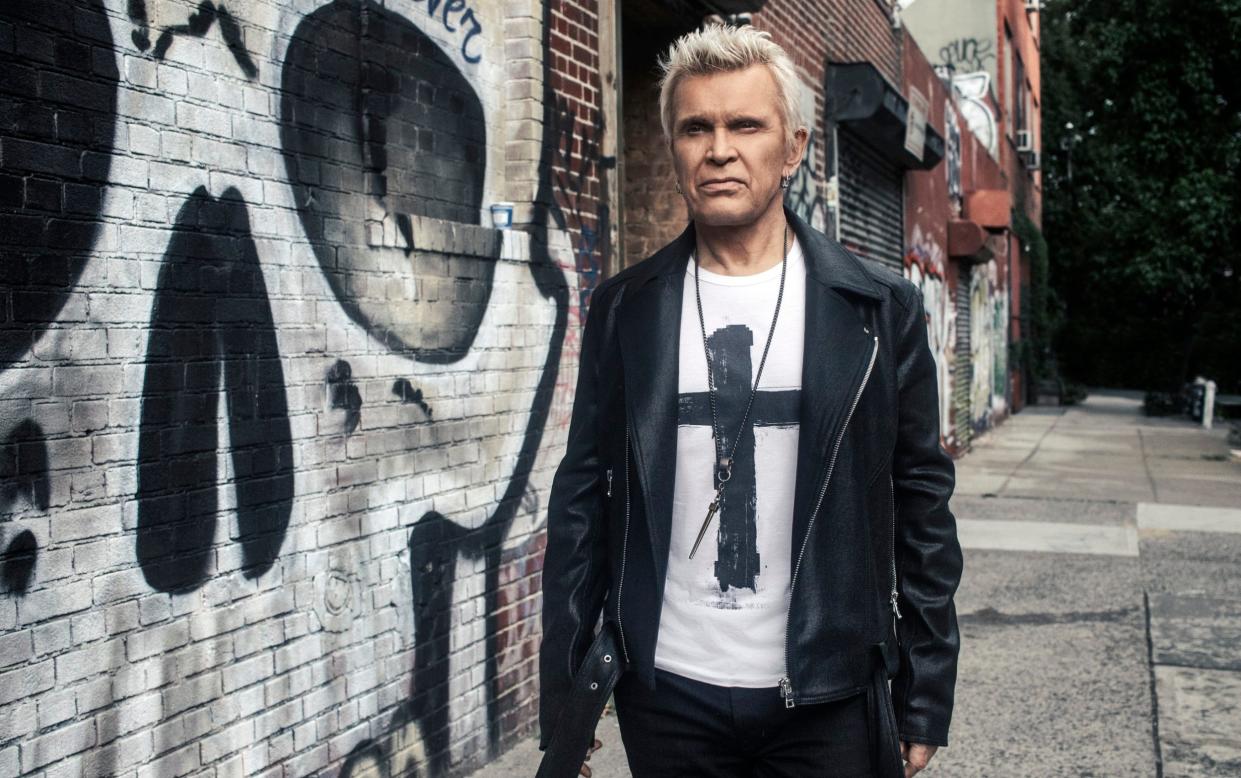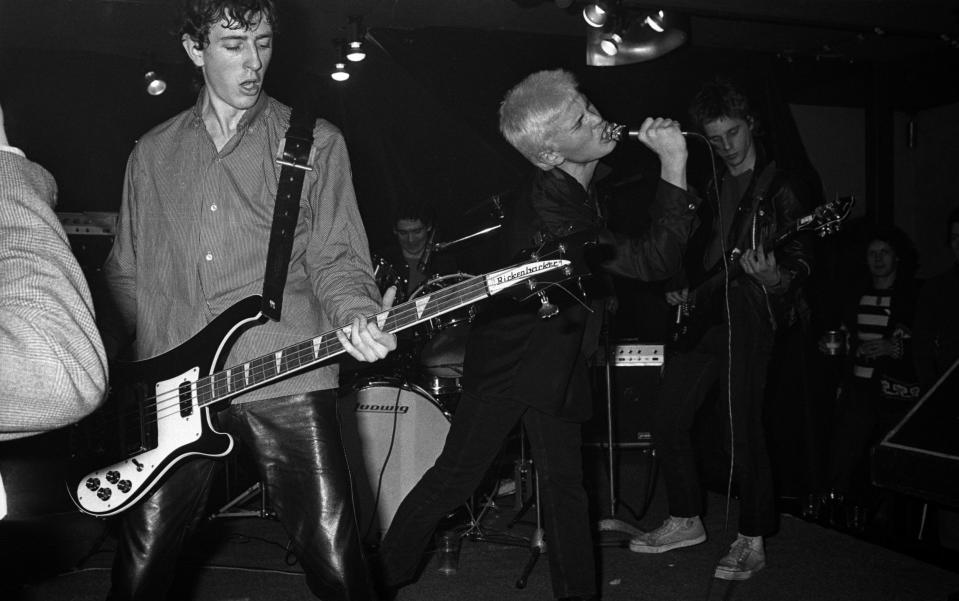Billy Idol: ‘Thank God I stayed alive – turns out it was worth it’

- Oops!Something went wrong.Please try again later.
- Oops!Something went wrong.Please try again later.
- Oops!Something went wrong.Please try again later.
- Oops!Something went wrong.Please try again later.
“There’s an element of ridiculousness and luck about my life,” chuckles Billy Idol. “I look back and it's all kind of wild and weird.”
The 66-year-old punk superstar points out that his bravura stage name was a misspelling. “Bone Idle, that’s what they called me at school. Really, I was Billy I-D-L-E. I wasn’t thinking about fame and stardom. I was just having a laugh.”
Likewise, his trademark blonde look came about by accident. He intended to have his hair coloured black and blue, but the hairdresser ran out of dye and Idol had to head off to rehearsals before the job could be finished. The effect of his bleached crop caused so much consternation amongst his bandmates that he decided to keep it. “I thought, ‘if it’s upsetting them, maybe there’s something about this!’”
Idol peers at me from a computer screen in a hotel in South America where he is currently on tour. The curtains are drawn against the light, and his face looms from the gloom, weathered but ruggedly handsome, spiky hair still bleached blonde. He has a throaty, wheezy laugh that sounds like Keith Richards gargling, and still speaks with a gritty London accent. “I never thought of myself as dramatically good looking,” he admits. “Like a lot of teenagers, I was a bit mousy and uncomfortable. Punk was all about invention. Why not be your own hero?”
When Idol formed Generation X in 1976, the iconography of his image was rooted in early rock ’n’ roll. “I was an amalgamation of all my heroes. ‘Iggy Bowie’ the NME used to call me, which was fair enough.” Part of the first wave of UK punk alongside friends in the Sex Pistols, and Siouxsie and the Banshees, Generation X revelled in a kind of pop art trashiness that was dismissed as comically unserious by most critics but made a pin-up of their striking frontman. “I couldn’t really sing in Generation X – some people might say I can’t really sing now. It's about the clothes, the way you walk on stage, everything. It was fun creating me. The stage version.”

Generation X only lasted for three albums, scoring a handful of minor UK hits before breaking up in 1981. But as a solo artist, Idol became a monumental figure, a comic book punk melding the snarl of new wave with spiky dance music. New York guitarist Steve Stevens provided sleek hooks over mechanical drum machine beats, whilst Idol curled his lip and helped American audiences connect the dots between his rebellious sound and such pretty boy rock idols as Elvis Presley and Eddie Cochran. Somehow, this much-derided figure, dismissed as an also-ran by UK critics, became arguably the most famous punk of his era. “The name, the look, the sound, it was killer for the 80s. MTV broke the stranglehold of American radio, and suddenly there was Prince, Madonna, Cyndi Lauper and Billy Idol, and the decade was rolling full on.”
Idol was born in Stanmore, Middlesex in 1955, but spent four years as a child in New York state, where his father worked as a salesman, before returning to the UK in 1961, his family eventually settling in Bromley, south-east London. “England seemed dark and interminably grey. Rock ’n’ roll brought the colour. I loved it, even as a small child: Chuck Berry, Buddy Holly, Little Richard. I remember seeing Gene Vincent on TV, where he wore all the leather, the medallion, all the motorcycles behind him, doing Pistol Packin’ Mama. Then it was The Beatles, The Stones, The Who, and England just took off, and I was drinking it all in.”
Idol had a succession of huge 80s hit singles, including White Wedding, Rebel Yell and Eyes Without a Face. But there was a darker side to fame, with Idol becoming something of a poster boy for rock ’n’ roll hedonism. In 1989, he took a break from recording his Charmed Life album to visit Southeast Asia on a sex and drugs binge that spanned three hotels, many brothels, tens of thousands of dollars in damages, and (according to his 2014 autobiography, Dancing With Myself), only ended with the intervention of the Thai military, when Idol was strapped to a hospital gurney, sedated by a nurse, and escorted to Bangkok airport by four armed soldiers. Admittedly, his recollections are patchy because he was “on a lot of heroin at the time.”
In 1990, Idol suffered a near-fatal motorcycle accident after he was hit by a truck riding home from a studio, high on many substances. In his autobiography he describes entering a “red dimension” in which a “circle of people holds my soul in a warm embrace”. He wound up with a steel rod in one leg, which had been reduced to a “bloody, mangled stump”, but it proved a turning point in his sobriety. “It was a time of a lot of pain and confusion. I didn’t know what my future would be. But I already knew I had to change. You can’t get high if you’re dead.”
There is a curious note of relish in his memory of his accident. “Really, being in the hospital, that’s probably the highest I ever was, because I had this little pain box. Every 12 minutes, I was able to give myself a hit of super pure morphine.” Idol laughs. “I mean, you had to say to yourself, ‘Man, when are you ever gonna be on something so pure again?’ But getting off heroin is one of the worst f______ things in the world. Boy George got it right when he said it's like your skeleton is trying to escape from your body. I think I frightened myself off. There’s a part that still scares me.”
Never a particularly prolific artist, Idol has a new EP, The Cage, made with long-time collaborator, guitarist Steve Stevens. The title song recreates the familiar Idol dance-punk attack, with chunky guitars and a lip curling vocal that finds Idol snarling, “I’ve been fighting my demons so long they’ve become my friends.”
“The story of my life, really,” says Idol. “I’ve done a lot of work to put that stuff in the rear-view mirror.” These days he says he “can have a couple of glasses of white wine at a restaurant. I do a little bit of pot. But, in general, I stay away from everything, and it’s great.”

Idol’s snappy sound has proved extremely durable. His colourful, comical appropriation of punk’s fierce attack provided a blueprint for the pop punk bands that followed, all the way from Green Day and Blink-182 to Busted and McFly. It can still be detected in the music of such contemporary artists as Yungblud (whose recent single The Funeral sounds like Idol on helium) and Machine Gun Kelly. Miley Cyrus is a fan, and Idol collaborated on Night Crawling from her last album. “She’s got guts and spirit,” he notes approvingly. “It’s good to see the fruits of punk rock still going on. 'Cos the times weren’t so different from now, we felt kind of hemmed in, oppressed, no opportunities, and punk kicked open a door, and how you went through it was up to you.”
A long-postponed UK tour kicks off in Manchester’s AO Arena next month, and Idol is relishing being back in action. “I’m knocked out to be still here, still loving it, who’d’ve thought?” He describes himself as “super British” even though he has lived in America since 1981.
But (unlike close friends Ozzy and Sharon Osbourne) he is not considering relocating from LA, where two adult children (from different relationships) and two young grandchildren live. The old punk goes visibly gooey at their mention. “I’m just glad I’m around to enjoy it. The little girls are lovely, and I’m really enjoying being grandad. So thank God I stayed alive - turns out it was worth it.”
Billy Idol begins his six-date Arena Roadside Tour (with guests Toyah and Television) to the UK from October 13. Tickets available from aegpresents.co.uk/billy-idol and all usual agents. The Cage EP is out now

